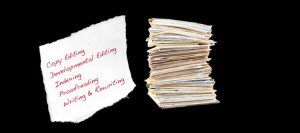You’ve finished your book / article / story, and you’re ready to hire an editor. You search the internet, find the names and email addresses of some promising-looking editors, and pick out a few to contact.
Now what? What should you say? How do you write a message that will get a response from an editor you would actually enjoy working with?
Having received scores of such inquiries, I know many authors struggle with what to say when they approach a potential editor. Here’s a handy Do and Don’t list of what to include in your initial email to a potential editor.
DO
- Describe what kind of book / article/ story you have written. Is it fiction or nonfiction? Memoir? Academic article? Be specific and descriptive. But concise.
- Explain how many words are in your manuscript. A word count is more helpful than any other measure. A page can have 50 words or 1,000 words depending on margins, font, type size, so describing your book as 250 pages long provides no meaningful information to an editor.
![]()
- Spell out what kind of editorial service you need. Are you looking for someone to help you shape your ideas into a final form? Or someone to give a final read to check for typos? Or just someone to talk to about your book idea? (Check my Services page to get an idea of different levels of editing.) If you’re not sure exactly what help you need, it’s perfectly OK to say so; a good editor is happy to help you figure that out.
- Provide your expected timeline. Especially let an editor know if you are looking for a quick turnaround. Most editors’ schedules are filled weeks or even months in advance, and you don’t want to spend a lot of time communicating with an editor who will not be able to meet your timeline.
- Describe how you learned about the editor. Did a former client give you a recommendation? Did you see a listing for the editor on a website or in a book? Editors like to know how potential clients find them because it can help them target their marketing efforts.
- Provide a few details about yourself and your writing or publishing experience. It is helpful for editors to know if they are communicating with someone who has been a professional writer for 25 years or someone who is a complete novice to writing and publishing. And it also helps prove you’re a real person and not a bot or potential scammer.
DON’T
- Attach a copy of any part of your text in your first communication. Many email programs will flag attachments from an unknown contact as spam and may not even deliver your email. And few editors will open an attachment from an unknown source.
- Send a long, page-by-page description of your book, or an explanation of why you chose to write a book, or a treatise on how much this work means to you. Editors read for a living and they may set aside an overly long email that doesn’t seem to have a point until “I have the time and energy to figure out what this person wants.” That day may never come.
- Forget to identify yourself in any meaningful way. Believe it or not, editors get a lot of emails from fake authors who are hoping to entrap us in overpayment schemes or entice us into opening virus-infested attachments. If there is too little identifying information in an email, a skeptical editor might simply trash it and never respond.
- Be too demanding or too needy. Some authors seem to want an editor who will be at their beck and call and act like they are doing the editor a favor to allow them to work on their book. Others seem to want to hire a counselor rather than an editor — someone who will respond to all their insecurities. Most editors have learned to run from authors who exhibit these behaviors — especially if they see them in a first contact.
Be Professional
An easy way to sum up all these tips? Treat this like a business transaction—because that’s what it should be.
When you write a concise, polite email that describes your work, you, and what you need from an editor, you are almost guaranteed to get a prompt response from an editor who will treat you like the professional writer you are — or want to be.
Have you ever sent off an email to an editor who didn’t respond? Do you have any idea what got you the silent treatment? What do you most worry about when you write to an editor for a first time? Leave me a comment and let me know if you have any questions or tips of your own about contacting a potential editor.
The post How Do You Write an Editor? appeared first on eDITMORE.



















